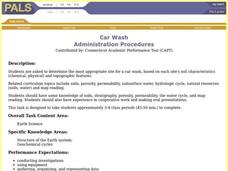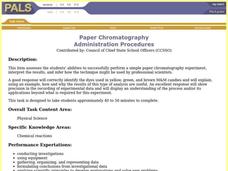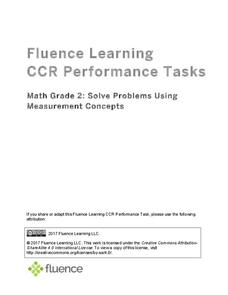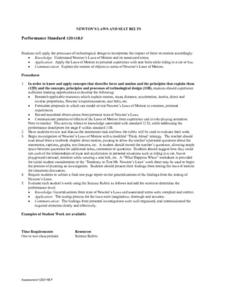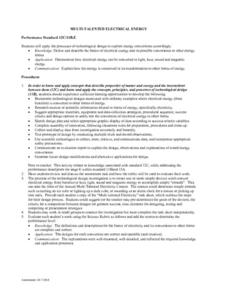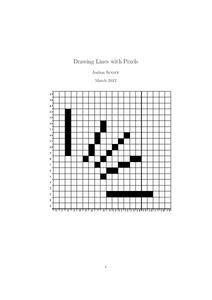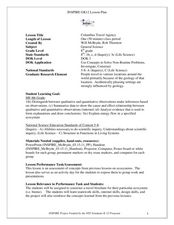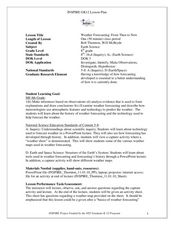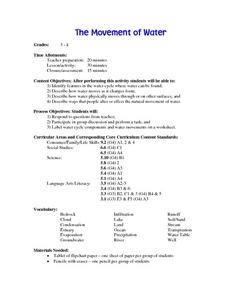Curated OER
Survival
Middle schoolers determine the best material from which to make a jacket to keep the body warm in a cold, dry, windy climate. This task assesses the student's ability to perform an entire investigation. In this question the independent...
Curated OER
Car Wash
Learners determine the most appropriate site for a car wash, based on each site's soil characteristics (chemical, physical) and topographic features. They perform an experiment to determine the changes to three different soil types when...
Curated OER
That's the Way the Ball Bounces
Students investigate and compare the bouncing ability of the materials from which four different balls are made. They determine which material performs the best for use as a basketball. After collecting data in a small group they...
Curated OER
Paper Chromatography
Small groups of students perform paper chromatography to separate food dyes into their component colors. Students perform the experiment and collect, organize, and represent their data to form an explanation of their outcomes. Students...
Fluence Learning
Solve Problems Using Measurement Concepts
Young mathematicians demonstrate what they know about measurement with a four-task assessment that focuses on estimation, length, and inches.
Curated OER
Oil Spill
Students use one of four absorbent products to separate as much of the oil and water mixture they are able to do. The purpose of this task is for students to collect and analyze data for the purpose of determining which absorbent is...
Curated OER
Newton's Laws and Seat Belts
Students study Newton's Laws of Motion. They review an assessment task and rubric and discuss Newton's Laws of Motion. They discuss how to test the relationships of mass and acceleration in personal situations. They write a one-page...
Curated OER
Threats to Validity
Students review the components of the scientific habits of mind. In groups, they use this information and relate it to scientific investigations. They develop strategies to evaluate information and evidence and how to question sources...
Curated OER
Multi-Talented Electrical Energy
Students explore energy conversions by demonstrating the conversion of electrical energy into light, heat, sound, and magnetic energy. Students create a simple device that converts electrical energy from batteries to heat, light, sound...
Concord Consortium
Acid Test
This isn't your typical basic lesson—it's more acidic! Learners use pH information to determine the hydroxide ion concentration of different substances and then use these values to analyze information. The calculations require...
Virginia Department of Education
Cell Division
Searching for simple ways to teach mitosis to high schoolers? Using colored chalk and onion root tips, pupils visually demonstrate what they view when looking through the lens of a microscope. There are also various ways to expand the...
Computer Science Unplugged
Drawing Lines with Pixels
How do the computers keep it straight? Using the provided algorithms, class members draw a line and a circle using pixels. They then check the drawings using a straight edge and compass to determine the accuracy of their drawings.
Curated OER
Columbus Travel Agency
Eighth graders research about their chosen ecosystem. In this life science lesson, 8th graders play the role of travel agents and create a travel brochure. They share this in class.
Curated OER
Peter The Butterfly
Pupils complete an interdisciplinary unit chronicling the life cycle and movement patterns of the butterfly. Through language arts, mathematics, and science activities, students identify various types of butterflies and document the...
Curated OER
Wild Animal Investigation - Habitat Diorama
Students research wild animals in cooperative groups and use their information to construct habitat dioramas. They demonstrate competence in using different information sources, including those of a technical nature, to accomplish...
Curated OER
Weather Forecasting: From Then to Now
Eighth graders review the history of weather forecasting. In this earth science lesson, 8th graders identify the different tools used in forecasting weather. They explain why it's important to know the weather.
Curated OER
The Movement of Water
Here is an excellent lesson plan on the water cycle and the states in which water exists. Learners identify the features of the water cycle, describe how water changes form, and look at ways that people affect the natural movement of...
Curated OER
The O Zone-Code Read Alert
What are the effects of an air quality alert? Expert groups receive one component of air quality information resources to study. Pupils then jigsaw into new groups and share their knowledge. Finally, they draft a statement of what they...
Curated OER
The Mozart Effect
Music has been said to effect short term memory. Learners test out this hypothesis, graphing how knowledge retention in a biology classroom changes when music is played in the background. In the end, a better appreciation of the dynamics...
Curated OER
Speed Challenge
In this science worksheet, students create a race track and mark each distance as stated. Then they perform each task and record the time it takes them for each. Students also record their data from the experiment into the chart...
Science Matters
Formative Assessment #2
Learners work collaboratively to predict what life would be like as an Arctic Hare. Teams go on a hunt where scholars role play an owl, white hares, and gray hares. Independently, pupils record their findings and reflect on their...
Teach Engineering
Design and Build a Rube Goldberg
Let's see how complicated we can make this simple task. The last activity associated with a 10-part series has groups design and build a Rube Goldberg machine. Teams determine a simple task to accomplish and use the engineering design...
Manchester College
Underhand Toss
A great lesson to teach the fundamentals of the underhand toss. Begin with some warm-ups, review how to do the underhand roll, and then teach the new skill of the underhand toss. The teaching activity is scaffolded and includes good...
Curated OER
A Colony is Born : Lesson 5 - Dear Mem
Discover colonies! Young historians will listen to a primary source journal entry read aloud with a backdrop of wave sounds. They discuss the entry, add historical facts to a chart and personal insights to another. Then they listen to...



